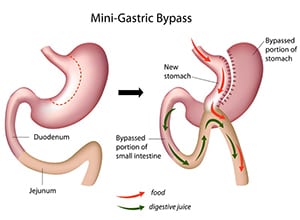Gastric Bypass
 Gastric bypass surgery is a type of surgical procedure that is designed to limit the amount of food that a person can eat, with the goal of achieving a significant amount of weight loss. The procedure also works to reduce the amount of nutrients that are absorbed through a person’s digestive system.
Gastric bypass surgery is a type of surgical procedure that is designed to limit the amount of food that a person can eat, with the goal of achieving a significant amount of weight loss. The procedure also works to reduce the amount of nutrients that are absorbed through a person’s digestive system.
A physician may recommend gastric bypass surgery if a patient has already tried multiple methods to lose weight, such as various types of diets and increasing their level weight loss surgery of physical activity. The procedure may also be recommended if a person has urgent medical conditions that necessitate the loss of body weight. Gastric bypass surgery is one of the most common surgeries performed in the United States and is also one of the safest types of weight loss surgeries.
Who Can Get a Gastric Bypass?
 Gastric bypass surgery is done on patients who are morbidly obese, which includes patients who have a body mass index (BMI) of greater than 40. The procedure is often recommended to people with BMI levels over 40 who also have a medical condition that is life threatening, such as diabetes, gastroesophageal reflux disease, heart disease, high blood pressure, or sleep apnea. If a person has a BMI of 35 to 39 and has one or more of those conditions, he or she may meet the physician’s treatment guidelines for the surgery.
Gastric bypass surgery is done on patients who are morbidly obese, which includes patients who have a body mass index (BMI) of greater than 40. The procedure is often recommended to people with BMI levels over 40 who also have a medical condition that is life threatening, such as diabetes, gastroesophageal reflux disease, heart disease, high blood pressure, or sleep apnea. If a person has a BMI of 35 to 39 and has one or more of those conditions, he or she may meet the physician’s treatment guidelines for the surgery.
Patients must also commit to making concurrent changes in their lifestyles in order to achieve the best possible level of success with their procedure. For example, patients must commit to following a specific diet, working with a nutritionist, and exercising regularly. Most patients will work with a personal trainer to start developing the core muscle strength needed for optimal recovery and to help augment the weight loss through dietary changes and the surgical procedure. Doctors will go through an extensive screening process to make sure that a person is healthy enough to undergo this surgical procedure. The patients must also be willing to engage in long-term follow up plans that include regular visits to the physician in order to monitor their health. This type of weight loss surgery requires a commitment from the patient, or any weight that is lost may not be long term.
When Is Gastric Bypass Utilized?
 Gastric bypass surgery may be used to treat morbid obesity that by itself—or along with another medical condition—could cause a person to experience severe quality of life issues or danger. The procedure’s goal is to help the patient get started on weight loss, but the surgery must also be accompanied by behavioral changes, treatment for other conditions, and monitoring of the person’s nutritional status. Your doctor will be able to determine if the procedure is a good fit for you.
Gastric bypass surgery may be used to treat morbid obesity that by itself—or along with another medical condition—could cause a person to experience severe quality of life issues or danger. The procedure’s goal is to help the patient get started on weight loss, but the surgery must also be accompanied by behavioral changes, treatment for other conditions, and monitoring of the person’s nutritional status. Your doctor will be able to determine if the procedure is a good fit for you.
How Can Gastric Bypass Benefit a Patient?
Before performing gastric bypass surgery on a patient, the physician will explain all of the risks and benefits. The risks and benefits of having a gastric bypass procedure are different for each patient. In general, the risks of this surgery include adverse reactions to anesthesia, the development of blood clots, and infection at the site of the incision. These risks are present for all patients who are undergoing a major surgery. There are also some risks specific to the gastric bypass procedure. Sometimes the procedure is so effective that patients are not able to absorb enough nutrients, which can result in malnutrition and vitamin deficiencies. These can be corrected through regular monitoring and the use of vitamins or supplements as recommended by a doctor.
The role of your doctor will be to determine if the procedure and its potential risks will outweigh the benefits that it could provide. Your doctor will learn about your current health, medical history, and lifestyle to determine if this or any other weight loss procedure will be beneficial for you. For this reason, it is very important to be honest with your doctor throughout your consultation.
To minimize any negative side effects, it is also very important to closely follow the instructions provided by your doctor as you prepare for the procedure. Following these instructions can help things to go more smoothly and can reduce negative side effects.
What Should Patients Expect After a Gastric Bypass Procedure?
 Most gastric bypass procedures are done with the use of laparoscopic surgical techniques. This results in a small incision and minimal scarring. When the surgery is performed in this way, the healing and recovery time is shorter and the patient can get started with physical activities earlier in the recovery process. For a day or two after the procedure, patients do not eat and instead are given IV nutrition. For about 12 weeks after the procedure, patients follow a strict and specific diet plan. This plan begins with a liquid diet that slowly progresses to soft foods and then regular foods. These plans are created for each individual to minimize pain and digestive problems like constipation or diarrhea.
Most gastric bypass procedures are done with the use of laparoscopic surgical techniques. This results in a small incision and minimal scarring. When the surgery is performed in this way, the healing and recovery time is shorter and the patient can get started with physical activities earlier in the recovery process. For a day or two after the procedure, patients do not eat and instead are given IV nutrition. For about 12 weeks after the procedure, patients follow a strict and specific diet plan. This plan begins with a liquid diet that slowly progresses to soft foods and then regular foods. These plans are created for each individual to minimize pain and digestive problems like constipation or diarrhea.
 Patients are usually given specific amounts of each type of food to eat. Weight loss may be rapid within the first six months after a gastric bypass procedure. The amount and rate of weight loss will vary by patient and with their adherence to dietary and exercise plans. Your doctor can help to give you an idea of the weight loss that you could experience.
Patients are usually given specific amounts of each type of food to eat. Weight loss may be rapid within the first six months after a gastric bypass procedure. The amount and rate of weight loss will vary by patient and with their adherence to dietary and exercise plans. Your doctor can help to give you an idea of the weight loss that you could experience.
Many patients also experience a reduction in problems related to being morbidly obese, such as needing less medication to treat diabetes or arthritis conditions. Patients can find the greatest level of success with gastric bypass procedures by keeping all of their follow up appointments and closely adhering to their dietary and exercise plans. A supportive social environment and social network can also help patients achieve a good outcome after the procedure. Overall, it is most important to follow the instructions provided by your doctor very closely following your procedure.
To learn more about gastric bypass for weight loss, or to learn about other types of weight loss procedures, contact our office today for a free consultation.
Contact Info
3420 Bristol St #700, Costa Mesa, CA 92626, USA
Orange Location
1310 W Stewart Dr. Suite 310, Orange, CA 92868, USA
*DISCLAIMER
In compliance with 16 CFR 255 and Federal Trade Commission Guidelines on the use of endorsements and testimonials in the marketing and advertising of websites:
The testimonials, statements, and opinions presented on our website are only applicable to the individuals depicted, and may not be representative of the experience of others. The testimonials are voluntary provided and are not paid, nor were they provided with free products, services, or any benefits in exchange for said statements. The testimonials are not indicative of future results or success of any other individuals. South Coast Specialty Surgery Center cannot and does not guarantee the medical outcome or the results of individuals utilizing the services provided by us or the providers in our network, or from any of the websites we link, or refer to. The testimonials and endorsements found on the site for the benefit of the site or individual services or procedures are, to the best of our knowledge, the true statements and beliefs of the individuals providing them. In short, surgery involves risk, results may vary, and outcomes are not guaranteed.
Some pages of this website may feature a depiction of a model showing emphasis of the torso. Product names may be mentioned in testimonials or elsewhere, and are trademarks or registered trademarks of their respective holders. Please refer to our Terms and Risks of Surgery pages for more information. Gastric Sleeve Surgery Centers performs Gastric Sleeve Surgery in Orange County, San Diego, Los Angeles, Riverside County and other location in Southern
California.
